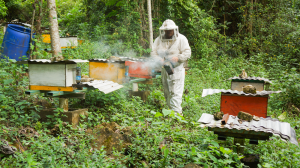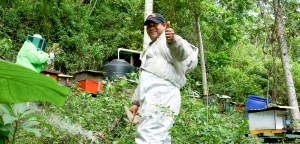The bee, key to human survival
By: Patricia Olivares

With only 1.5 centimeters in size and 5 years of average life, the bees are the main pollinators of the planet, have inhabited the earth for more than 30 million years and perform an essential function in the equilibrium of nature, as they contribute to food security and human nutrition, the survival of species and the conservation of biodiversity.
Although more than 20,000 different subspecies of bees are known, divided into 7 recognized families, and inhabits all continents except Antarctica, its population has declined so much that it is in danger of becoming extinct, due to the effects of human activity. Therefore, World Bee Day takes on vital relevance, to take actions that will determine the future of the planet, of humanity, of life itself.

Antonio Trujillo Gómez, Amextra’s beekeeping promoter for more than 8 years, has implemented a conscientious work with the bees -from agro ecological beekeeping– to protect them and increase their population, and also, to help people from highly marginalized communities with honey production.
“We have to raise awareness for the care of bees and other pollinators, because today they face many threats such as: the high use of agrochemicals and very lethal pesticides and pesticides that kill the lives of these living being and, in addition, they pollute the aquifers; and finally, the immoderate felling of forests”.
Pollination is an essential process for the production and reproduction of many crops and wild plants. So, almost 90% of flowering plants depend on pollination to reproduce; Almost 90% of flowering plants depend on pollination to reproduce; 75% of the world’s food crops depend to some extent on pollination and 35% of the world’s agricultural land. Therefore, we depend on the survival of bees.
Antonio remembers that, when he was 6 years old, he had his first experience of going to harvest honey, because his father had 8 beehives.
“My father did it in a rustic, traditional way; he didn’t have any technical skills. He even put a shawl on my head to cover my face; the bees stung me on my arms and back, they became defensive, but still the bees kept attracting my attention. More when I looked at them foraging in the flowers!

As a result of this experience, he continued to study and document himself in the work and care of bees. At the age of 22 he began to specialize with courses focused on good livestock practices in honey harvesting; and currently, he has managed to train and transmit his passion in beekeeping to women and men from the communities, to transmit knowledge and become beekeepers and promoters of transformation!
“At Amextra, monitoring visits are given directly to the production units, to provide management recommendations to beekeepers; who have been given timber trees in reforestation campaigns, thanks to ADO Foundation, Immanuel Lutheran Church and Linda Vista Foundation”.
So, Amextra contributes to the care of bees from the Environment program, in the apiary of the Pej’pem Agroecological Center and the communities of Ocosingo and Palenque, with various actions aimed at sensitizing, informing, training and replicating what has been learned in the community, in the plots of beneficiaries, to contribute to the balance of biodiversity and to the family economy.
Six years ago, Antonio gave a training workshop at the Pej’pem Agroecological Center to a group of rubber tappers, belonging to the locality of Nueva Esperanza, 2nd section, Municipality of Palenque; because they were very interested in working with bees, but knew nothing about it. At the end, they told him that they had no money, but they did have land for planting rubber and other species of flowers native to the community.

“So I told him, locate wild swarms and I will come to teach you, to catch them, and to care for them; and so it was, after 15 days they told me that they had already located 3 swarms. I supported them by catching one and the rest they did.
In the course of 5 months, they had already caught about 15 colonies, the materials were provided by Amextra and as the months went by, the colonies grew stronger until harvest day arrived. They thought that no more than 10 or 15 kilos would be harvested. I told them, there will be more harvest and in the first extraction about 140 kilos of honey was harvested.
Those men were super excited! Then followed, currently the collective has an inventory of 59 beehives and have managed to harvest 1,460 liters of honey. Two of them have become local promoters!, Because they have shared their knowledge by making new beekeepers in their region!
Finally, if you want to help the bees or assist in identifying a swarm:
“Do not try to approach or disturb them without proper protective equipment. If you see a swarm positioned somewhere – since the bee by nature defends itself – call an expert or a beekeeper who is close to the area for rescue and provide better conditions for the care and survival of the bees”.
Also, let’s respect and live with one of the oldest insects on Earth, don’t kill them: “the bee goes away, if you leave it in peace”. Let’s live together and protect the bees to rebuild the future of our planet, after the COVID-19 pandemic crisis. We have a lot to do!
If you are interested in helping or taking any training in beekeeping, working with bees or caring for the environment click here or contact us.
© 2023 Amextra, Asociación Mexicana de Transformación Rural y Urbana A.C. Todos los derechos reservados, México 2017-2023.








Leave a Reply